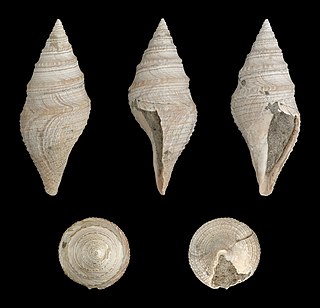
The Cenozoic is Earth's current geological era, representing the last 66 million years of Earth's history. It is characterized by the dominance of mammals, birds and flowering plants, a cooling and drying climate, and the current configuration of continents. It is the latest of three geological eras since complex life evolved, preceded by the Mesozoic and Paleozoic. It started with the Cretaceous–Paleogene extinction event, when many species, including the non-avian dinosaurs, became extinct in an event attributed by most experts to the impact of a large asteroid or other celestial body, the Chicxulub impactor.

Plotopteridae is an extinct family of flightless seabirds from the order Suliformes. Related to the gannets and boobies, they exhibited remarkable convergent evolution with the penguins, particularly with the now extinct giant penguins. That they lived in the North Pacific, the other side of the world from the penguins, has led to them being described at times as the Northern Hemisphere's penguins, though they were not closely related. More recent studies have shown, however, that the shoulder-girdle, forelimb and sternum of plotopterids differ significantly from those of penguins, so comparisons in terms of function may not be entirely accurate. On the other hand, there is a theory that this group may have a common ancestor with penguins due to the similarity of brain morphology. But the endocast morphology of stem group Sphenisciformes differs from both Plotopteridae and modern penguins.

The Gempylidae are a family of perciform fishes commonly known as snake mackerels or escolars. The family includes about 25 species.

Sirenia is the order of placental mammals which comprises modern "sea cows" and their extinct relatives. They are the only extant herbivorous marine mammals and the only group of herbivorous mammals to have become completely aquatic. Sirenians are thought to have a 50-million-year-old fossil record. They attained modest diversity during the Oligocene and Miocene, but have since declined as a result of climatic cooling, oceanographic changes, and human interference. Two genera and four species are extant: Trichechus, which includes the three species of manatee that live along the Atlantic coasts and in rivers and coastlines of the Americas and western Africa, and Dugong, which is found in the Indian and Pacific oceans.

Carcharias is a genus of sand tiger sharks belonging to the family Odontaspididae. Once bearing many prehistoric species, all have gone extinct with the exception of the critically endangered sand tiger shark.

Megasurcula is a genus of medium-sized predatory sea snails, marine gastropod molluscs in the family Pseudomelatomidae, a family previously lumped with others collectively known as turrids. Species within this genus occur in the Eastern Pacific Ocean

Bathytoma is a genus of deep-water sea snails, marine gastropod mollusks in the family Borsoniidae.
Bathytoma bartrumi is an extinct species of sea snail, a marine gastropod mollusk in the family Borsoniidae.
Bathytoma haasti is an extinct species of sea snail, a marine gastropod mollusk in the family Borsoniidae.

Bathytoma cataphracta is an extinct species of sea snail, a marine gastropod mollusk in the family Borsoniidae.
Bathytoma finlayi is an extinct species of sea snail, a marine gastropod mollusk in the family Borsoniidae.
Bathytoma discors is an extinct species of sea snail, a marine gastropod mollusk in the family Borsoniidae.
Bathytoma paucispiralis is an extinct species of sea snail, a marine gastropod mollusk in the family Borsoniidae.
Bathytoma proavita is an extinct species of sea snail, a marine gastropod mollusk in the family Borsoniidae.
Bathytoma mitchelsoni is an extinct species of sea snail, a marine gastropod mollusk in the family Borsoniidae.
Bathytoma praecisa is an extinct species of sea snail, a marine gastropod mollusk in the family Borsoniidae.
Bathytoma tenuineta is an extinct species of sea snail, a marine gastropod mollusk in the family Borsoniidae.
Bathytoma nonplicata is an extinct species of sea snail, a marine gastropod mollusk in the family Borsoniidae.
Bathytoma prior is an extinct species of sea snail, a marine gastropod mollusk in the family Borsoniidae.
Bathytoma wairarapaensis is an extinct species of sea snail, a marine gastropod mollusk in the family Borsoniidae. As the species name implies, it was described from the Wairarapa.







